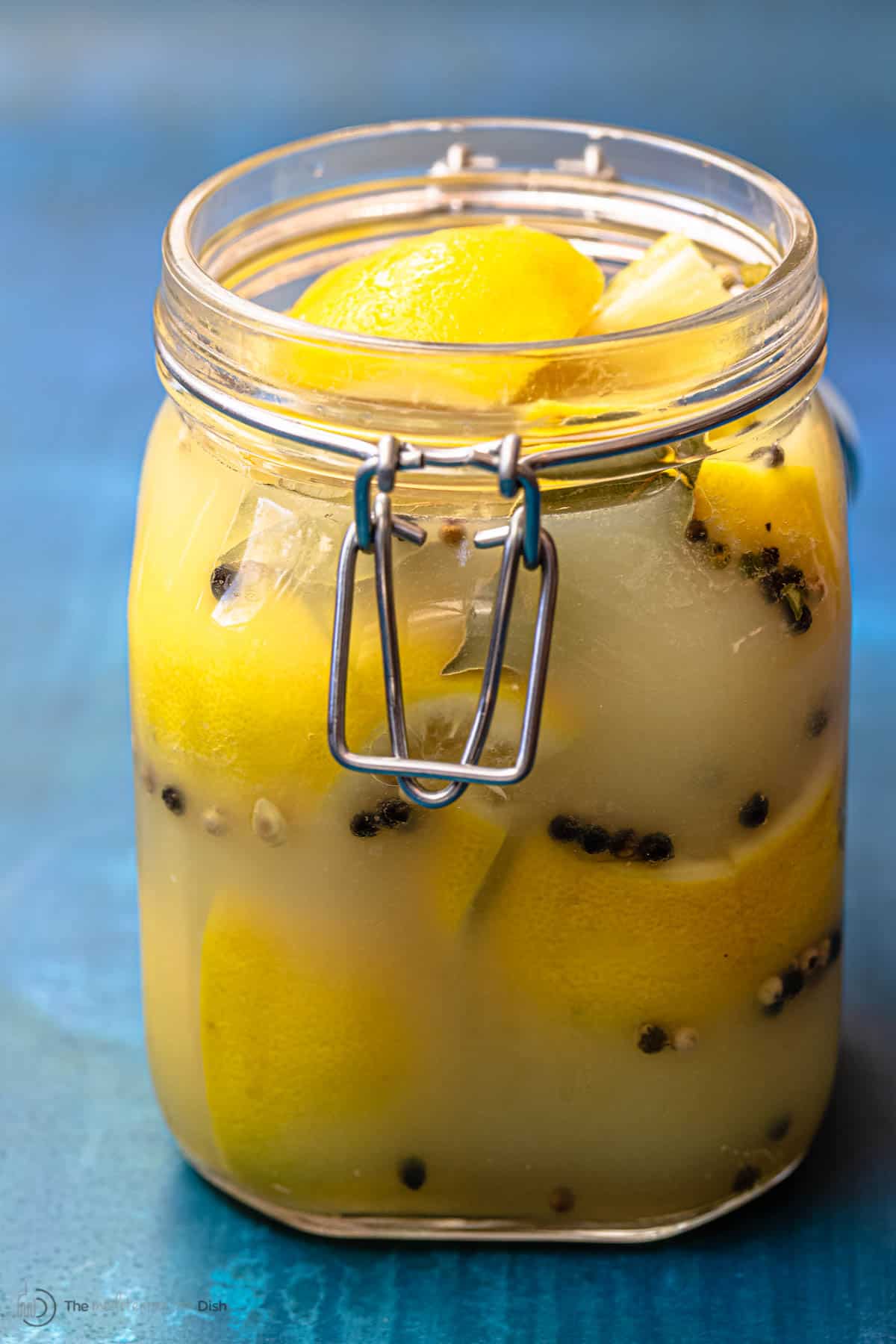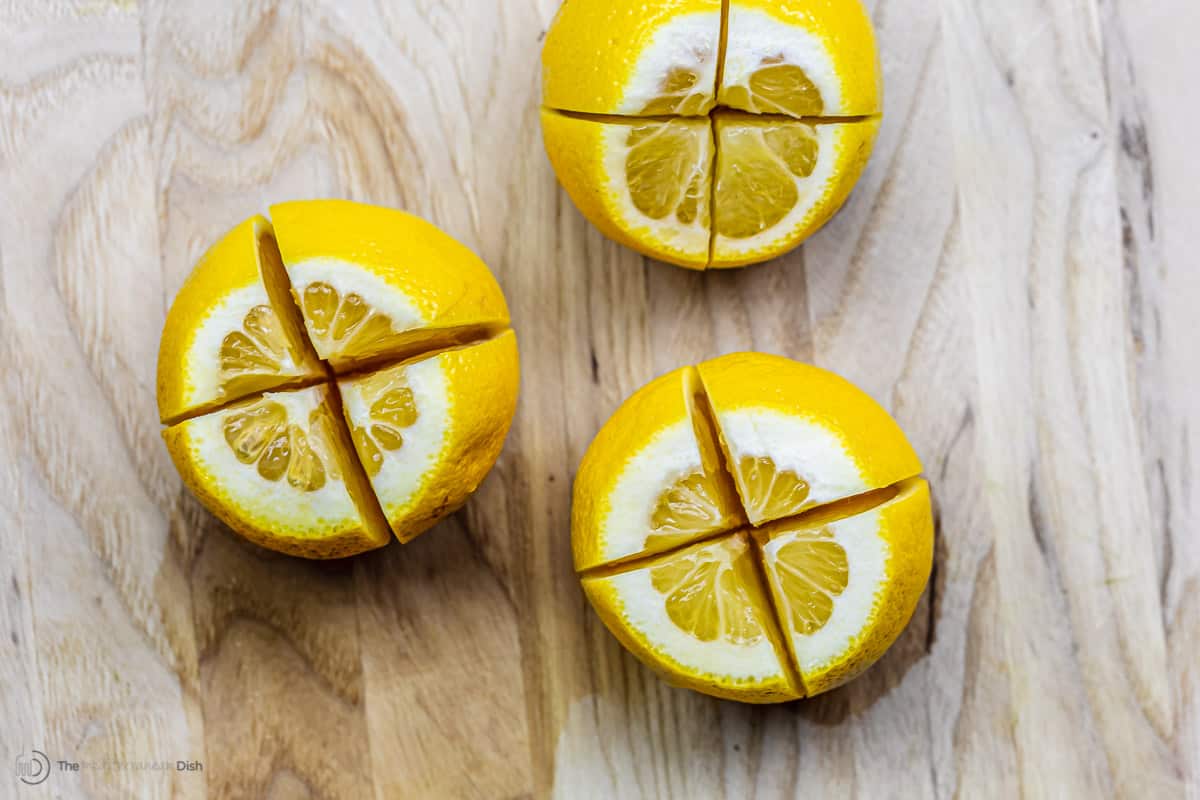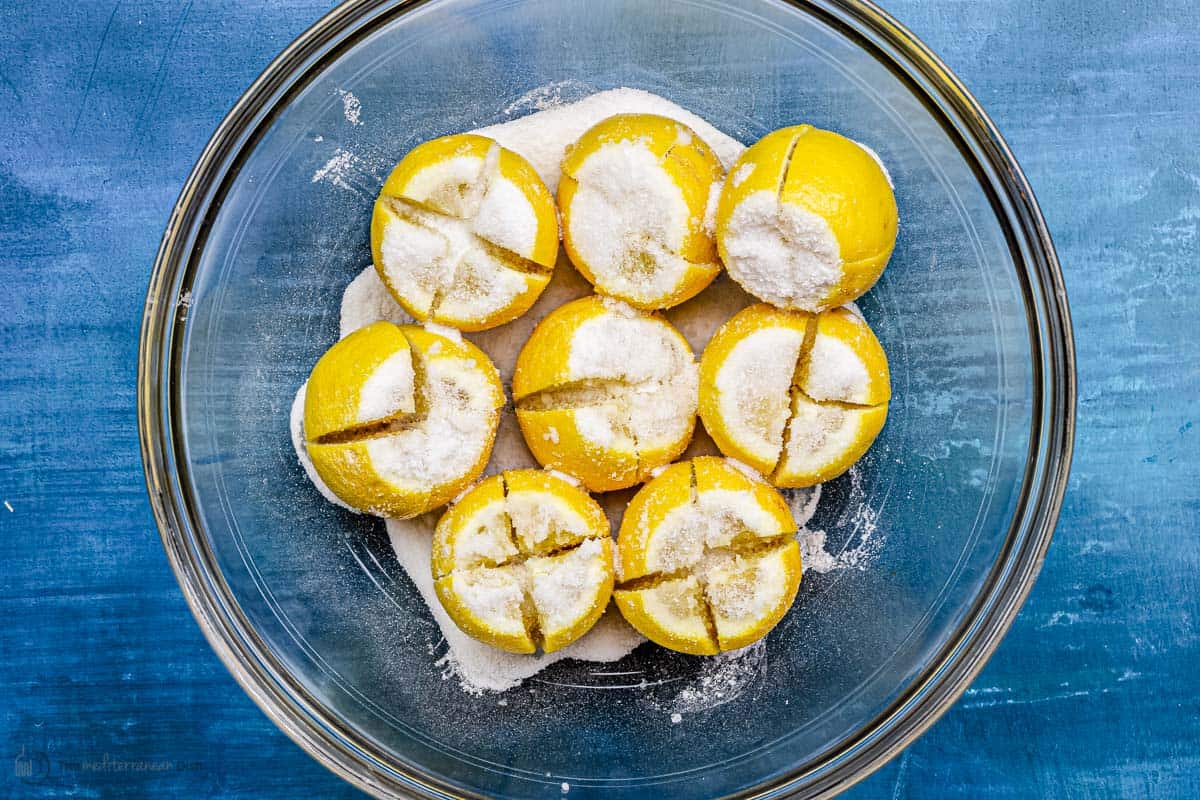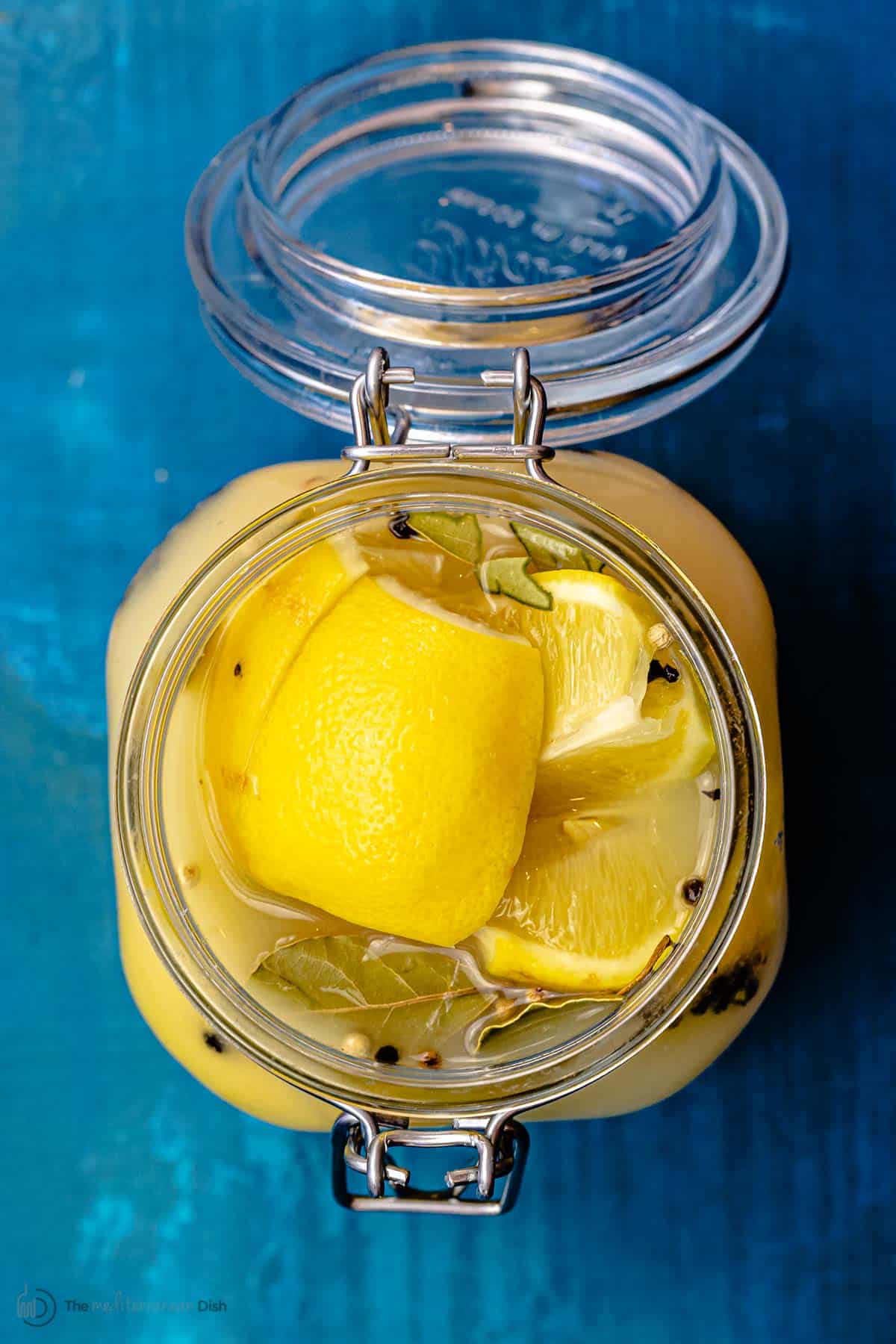This easy step-by-step tutorial is all you need to make the best preserved lemons at home! You can use them to add brightness, tang, and flavor to everything from your lunch sandwiches to stews, tagines, and more!

Growing up in Egypt, all sorts of pickles showed up on the dinner table. They were no less important than dad’s lazy tomato and cucumber salad or the tahini sauce we drizzled on everything from falafel to kofta. I loved pickled cucumber and lemons most though.
Preserved lemons have long been a part of Mediterranean and Middle Eastern cooking, although most people associate them with North African, and particularly Moroccan cuisine, and the famous chicken tagine.
Here in the States, depending on where you live and how much you’re willing to pay, you may be able to pick up a jar of pickled lemons at a specialty grocery store. Or you may find them at the olive bar next to things like pickled cucumber and marinated artichoke hearts and pickled cucumbers.
But, preserved lemons are super easy and far cheaper to make at home. They’ll take only 20 minutes of work and a handful of familiar ingredients. The hard part is in waiting. Once you pickle your lemons, it will take 3 to 4 weeks before you can use them. But the wait is so worth it!
What do preserved lemons taste like?
When preserving lemons, you are essentially pickling them with lots of kosher salt and lemon juice. As they sit in the pickling jar, the lemons will gently deflate and soften. Their strong tartness will mellow, but salt-preserved lemons will taste bright and citrusy.
What kind of lemons are good for preserving?
Since you’ll be eating the entire fruit, I recommend buying organic Eureka lemons (regular lemons) that have not been sprayed or treated with chemicals. Select ones that are heavy for their size with thin fine-textured peel and dep yellow color. Meyer lemons are also a great option, since their thinner skins are not very bitter.
How to make preserved lemons
- Scrub the lemons clean
Clean the lemons very well by scrubbing them under running water. - Cut the lemons
Trim 8 large lemons on the top and bottom by cutting about 1/4-inch on each side. From there, stand the lemons flat on a clean cutting board. Keeping the lemons attached at the bottom end, cut each lemon into quarters part-way through.
- Soak the lemons in lots kosher salt and little sugar and refrigerate for 1 day
Transfer the lemons to a large bowl. Prepare 1/2 cup of kosher salt and 2 tablespoons of sugar. Open up the lemons at the top and stuff each with plenty of the salt and sugar mixture, then roll them around in whatever remains of the salt and sugar. Cover the bowl with plastic wrap and refrigerate overnight and up to 24 hours. - Transfer to a sterilized canning jar and add peppercorns, bay leaf, and lemon juice
The following day, the lemons will have released some juice. Transfer the salted lemons and their juices to a large sterilized canning jar. Press the lemons down so firmly into the jar. Add a couple tablespoons of pepper corns and a few dry bay leaves. Add fresh lemon juice to fill the jar and cover the lemons (you’ll use juice of another 8 lemons or 2 1/2 cups of fresh lemon juice). Be sure to submerge the lemons so that the lemon juice covers the very top). - Seal and refrigerate for 1 month
Now, cover the jar tightly and refrigerate for 3 weeks and up to 1 month before consuming. The lemons will soften and mellow as they sit in the pickling liquid. - Salt-preserved lemons will keep in the fridge for up to 6 months.
What are preserved lemons good for?
Pickled lemons are often used in North African cooking to add brightness and flavor to stews, soups and more. They give a bright burst of flavor that’s delicious with fish, like with our stuffed salmon recipe.
You can also use some in place of lemon slices in my Chicken Tagine recipe. You can also cut up tiny bits and add them in small amounts to things like Moroccan lamb stew, vegetable tagine, or lentil soup.
Pickled lemons can transform your lunch sandwiches; just add them as you would any pickled vegetables. You can also slice them up and toss them with some roasted vegetables, or add them as a side next to anything from spatchcock chicken to salmon kabobs, shawarma salad bowls…the possibilities are endless!
Or, if you’re using as a garnish and you’re short on time, fried lemons work as a substitute.
Do preserved lemons go bad?
Properly stored in the fridge, salt-preserved lemons can keep for a good 6 months. It is important to use a good canning jar with a tightly closed lid, and make sure the lemons are well submerged in the lemon juice. Some sources say they will last a good year, that may be, but I like to play it safe. Also, we use them so regularly over here that they do not last very long.
Tools you’ll need
- Large mixing bowl
- A tight-lid canning jar that should fit the lemons snuggly (I used a 2-liter jar) The jar you choose should fit all the lemons snuggly.
Other condiments you may like
- Roasted Peppers (2 ways)!
- Whipped Toum (4-ingredient garlic sauce)
- Homemade harissa
- Moroccan Fish Recipe
You may also enjoy 50+ Top Mediterranean diet recipes. For all recipes, visit us here.
Preserved Lemons Recipe

Ingredients
- 8 large lemons
- ½ cup Kosher salt
- 2 tablespoons of sugar
- 2 tablespoons pepper corns
- 4 to 5 dry bay leaves
- Fresh lemon juice of 7 to 8 lemons, (about 2 1/2 cups of fresh lemon juice)
Instructions
- Cut about 1/4 -inch of the top and bottom of the lemons. Cut each lemon into quarters part-way through so that they remain connected at the bottom
- Transfer the lemons to a large bowl and toss well with the salt and sugar. Open up the lemons some and stuff them with the kosher salt and sugar mixture. Cover the bowl with plastic wrap and refrigerate overnight and up to 24 hours, the lemons will release some juice.
- The next day, transfer the lemons and their juices to a large sterilized canning jar. Press them down firmly into the jar. Add the pepper corns and bay leaves. Top with fresh lemon juice (your goal is to submerge the lemons in the juice).
- Seal the jar shut and store in the fridge for 3 weeks to 1 month before consuming.
Video
Notes
- Jar Options: I used this 33.75-ounce jar to fit all the lemons. Note that lemon sizes will vary, so the important thing is to select a large jar with an air-tight lid that will fit the lemons snuggly. You can use a couple of smaller jars too, that will work.
- How long will salt-preserved lemons last in the fridge? If properly stored in the fridge, they will keep for up to 6 months.
- Preserved lemons will be mellow but intense with flavor…their flesh and skins are tender and edible.
- The serving size here is 1/2 preserved lemon.
- Visit Our Shop to browse quality Mediterranean ingredients including extra virgin olive oils and spices.





Love mixing these with roasted veggies! Gives them a great zip! I have never thought to put them on sandwiches. Will have to try that next.
I tried to make preserved lemons before and they didn’t turn out very good, but that’s because I used them before they were ready. Your recipe sounds so much better and easier. Can you tell me the size of the jar you used? I don’t want to get one that is too large or small. I have jars that are 1.5 quarts but they are too small.
Thanks!
Hi, Janis! I used this 33.75-ounce jar to fit all the lemons: https://amzn.to/3eZot4V . Note that lemon sizes will vary, so the important thing is to select a large jar with an air-tight lid that will fit the lemons snuggly. You could use a couple of smaller jars too, that will work.
*Typo alert: it’s “snugly,” not “snuggly.” We’re not snuggling up with the lemons, just making them snug inside the jar.
I just made these. There is enough juice but my lemons are bobbing up. Do I leave alone? Shake? Add more juice?
Hi, Misty. As long as they are completely covered in juice, they should be just fine.
those lemons are the best .
Thanks Suzie.
Thanks so much, Nelly!
Question…I am making these right now… Do I add all the salt/sugar mixture to the jar with the lemons?
I’m so sorry I’m just seeing this, Victoria. I’m not always able to answer questions right away. For future reference, yes, I typically do.
Hi, I’ve made preserved lemons following a different recipie. I waited for them to mature. I washed the salt off but they were so salty. I had to throw them away. So disapointing as the lemons were from my own tree. I would be grateful for any comments please.
Hmmm… since it was another recipe you tried, it’s hard for me to say what may have gone wrong. I have not experienced over-saltiness with this recipe.
This will be perfect for adding brightness and flavor to my savory dishes all winter long. Who knew preserving lemons was this easy? Thanks again Suzy!
You are very welcome, Lisalia! Enjoy!
This looks so easy and perfect for many recipes! I can’t wait to make this! My daughter and I love lemons, so this is perfect for us!
Awesome! Thanks, Beth!
I had no idea you preserve lemons. Now there is no going back! Delicious
Enjoy! 🙂
Wow! What a great recipe, I had never done this before but am pleasantly surprised at how easy it was!
I’m happy to hear that, Noelle! Thank you!!
I need preserved lemons for your Moroccan Chicken for Saturday. Today is Thurs. If I may them today, can I use them tomorrow? Is there a way to speed up the ‘pickle’? Thank you. Love your recipes.
Hi, Brenda. Unfortunately there isn’t a way to speed this one up :(. It does take some time to pickle.
I was thinking of preserving some lemon; your recipe came right on time. Thank you!
Thanks, Samia! Glad to hear it!
I have not tried this yet but I did make the Vegetarian Stuffed Eggplant and they were really good I will make them again I also made the Greek Res Lentil Soup it was really good and I will make again. Thank You for the recipes !
You are very welcome, Kathryn! So glad you’re enjoying them!
Howdy Suzy! I finally made this recipe, and the lemons are ready! They are so flavorful. I am making your braized lamb shanks this afternoon, and I will be adding some of these lemons to the rice dish I am preparing.
This was a wonderful and flavorful recipe, and we are enjoying the lemons whenever we can!
I got this recipe from one of your email newsletters. I have also tried several other newsletter recipes…like the Menemen. Made that the other day for dinner,! yum!
Much respect for you and your kitchen!
Jeff
Hi, Jeff! Glad to hear you are enjoying the lemons! There are so many ways to use them to brighten up recipes. Hope they went well with the rice!
This looks much more convenient and interesting flavor than the recipe I’ve used in the past.
You don’t specify, but would you recommend Meyer lemons? Organic?
Hello! Definitely organic. Meyer are a great option! You’ll find more details under the section “What kind of lemons are good for preserving?” towards the end of the post :). Enjoy!
Hello. i think this sounds phenomenal and I was wondering if there is any sugar substitute or alternative more natural sweetener that can work, Honey? coconut sugar? i have really been enjoying your recipes as i have changed my lifestyle to heal my body and life healthFULLY!
Hi, Lori! I have not tried it with any sort of sugar substitute or alternative, so it’s hard for me to advise on that. The use of the sugar here is to help draw out some of the juices. Only a small amount is needed, so you could just try omitting it, if your prefer.
I had the same question. Did you try without sugar? I have just found this site and would just adore doing this for homeschool activity with my boys.
Hello, nice !!!!, thank you for sharing. It is the first preserved lemons recipe where you can eat the flesh as well. All the recipes I found, they discard it and just use the rind. That is why I never try it because I consider it a waste throwing all the flesh.
Awesome! Hope you enjoy it, Susana!
Wow! I had no idea how easy preserved lemons are to make! I absolutely LOVE this recipe. You’re right the hardest part is to wait for them to pickle!
Totally! Thanks, Cindy
Thanks for this! I just picked a mountain of lemons from the trees on our property and was thinking about preserving them. Perfect timing!
I love your recipes. So easy and delicious!
Louise
Thank you so much, Louise!